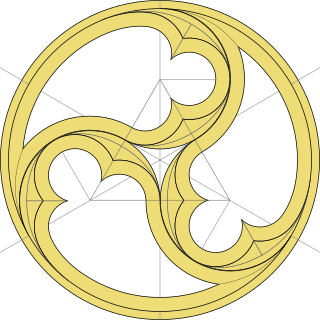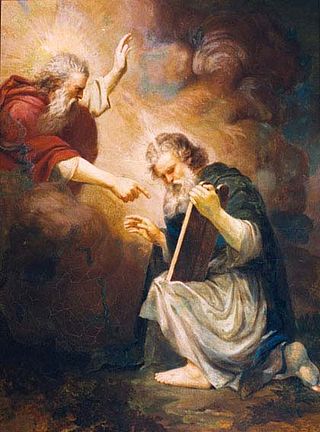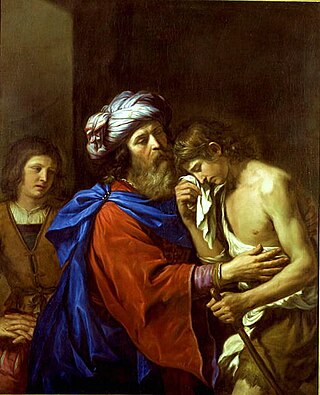
The Second Coming is the Christian belief that Jesus will return to Earth after his ascension to heaven. The idea is based on messianic prophecies and is part of most Christian eschatologies. Other faiths have various interpretations of it.

Concupiscence is an ardent, usually sensual, longing. In Christianity, particularly in Catholic and Lutheran theology, concupiscence is the tendency of humans to sin.

Conversations with God (CWG) is a sequence of books written by Neale Donald Walsch. It was written as a dialogue in which Walsch asks questions and God answers. The first book of the Conversations with God series, Conversations with God, Book 1: An Uncommon Dialogue, was published in 1995 and became a publishing phenomenon, staying on The New York Times Best Sellers List for 137 weeks.

A mortal sin, in Christian theology, is a gravely sinful act which can lead to damnation if a person does not repent of the sin before death. It is alternatively called deadly, grave, and serious; the concept of mortal sin is found in both Catholicism and Lutheranism. A sin is considered to be "mortal" when its quality is such that it leads to a separation of that person from God's saving grace. Three conditions must together be met for a sin to be mortal: "Mortal sin is sin whose object is grave matter and which is also committed with full knowledge and deliberate consent." The sin against the Holy Spirit and the sins that cry to Heaven for vengeance are considered especially serious. This type of sin is distinguished from a venial sin in that the latter simply leads to a weakening of a person's relationship with God. Despite its gravity, a person can repent of having committed a mortal sin. Such repentance is the primary requisite for forgiveness and absolution.

In Christianity, angels are the messengers of God.

The Catholic Church, also known as the Roman Catholic Church, is the largest Christian church, with 1.378 billion baptized Catholics worldwide as of 2021. It is among the world's oldest and largest international institutions, and has played a prominent role in the history and development of Western civilization. The church consists of 24 sui iuris churches, including the Latin Church and 23 Eastern Catholic Churches, which comprise almost 3,500 dioceses and eparchies located around the world. The pope, who is the bishop of Rome, is the chief pastor of the church. The Diocese of Rome, known as the Holy See, is the central governing authority of the church. The administrative body of the Holy See, the Roman Curia, has its principal offices in Vatican City, a small independent city-state enclave within the Italian capital city of Rome, of which the pope is head of state.
In Christian theology, the beatific vision is the ultimate direct self-communication of God to the individual person. A person possessing the beatific vision reaches, as a member of redeemed humanity in the communion of saints, perfect salvation in its entirety, i.e., heaven. The notion of vision stresses the intellectual component of salvation, though it encompasses the whole of human experience of joy, happiness coming from seeing God finally face to face and not imperfectly through faith..
Catholic social teaching (CST) is an area of Catholic doctrine which is concerned with human dignity and the common good in society. It addresses oppression, the role of the state, subsidiarity, social organization, social justice, and wealth distribution. CST's foundations are considered to have been laid by Pope Leo XIII's 1891 encyclical, Rerum novarum, which advocated distributism. Its roots can be traced to Catholic theologians such as Thomas Aquinas and Augustine of Hippo. CST is also derived from the Bible and cultures of the ancient Near East.

The ransom theory of atonement was a theory in Christian theology as to how the process of Atonement in Christianity had happened. It therefore accounted for the meaning and effect of the death of Jesus Christ. It was one of a number of historical theories, and was mostly popular between the 4th and 11th centuries, with little support in recent times. It originated in the early Church, particularly in the work of Origen. The theory teaches that the death of Christ was a ransom sacrifice, usually said to have been paid to Satan, in satisfaction for the bondage and debt on the souls of humanity as a result of inherited sin.

In Christian theology, the doctrine of incarnation teaches that the pre-existent divine person of Jesus Christ, God the Son, the second person of the Trinity, and the eternally begotten Logos, took upon human nature and "was made flesh" by being conceived in the womb of a woman, the Virgin Mary, also known as the Theotokos. The doctrine of the incarnation then entails that Jesus was at the same time both fully God and fully human.

Perichoresis is a term referring to the relationship of the three persons of the triune God to one another. Circumincession is a Latin-derived term for the same concept. It was first used as a term in Christian theology, by the Church Fathers. The noun first appears in the writings of Maximus Confessor but the related verb perichoreo is found earlier in Gregory of Nazianzus. Gregory used it to describe the relationship between the divine and human natures of Christ as did John of Damascus, who also extended it to the "interpenetration" of the three persons of the Trinity, and it became a technical term for the latter. It has been given recent currency by such contemporary writers as Jürgen Moltmann, Miroslav Volf, John Zizioulas, Richard Rohr, and others.

Christian Discourses is a book by Søren Kierkegaard originally published in Danish in 1848.
Free will in theology is an important part of the debate on free will in general. Religions vary greatly in their response to the standard argument against free will and thus might appeal to any number of responses to the paradox of free will, the claim that omniscience and free will are incompatible.

Interior life is a life which seeks God in everything, a life of prayer and the practice of living in the presence of God. It connotes intimate, friendly conversation with Him, and a determined focus on internal prayer versus external actions, while these latter are transformed into means of prayer.

Divine filiation is the Christian doctrine that Jesus Christ is the only-begotten Son of God by nature, and when Christians are redeemed by Jesus they become sons of God by adoption. This doctrine is held by most Christians, but the phrase "divine filiation" is used primarily by Catholics. This doctrine is also referred to as divine sonship.
Catholic theology is the understanding of Catholic doctrine or teachings, and results from the studies of theologians. It is based on canonical scripture, and sacred tradition, as interpreted authoritatively by the magisterium of the Catholic Church. This article serves as an introduction to various topics in Catholic theology, with links to where fuller coverage is found.

The Ten Commandments are series of religious and moral imperatives that are recognized as a moral foundation in several of the Abrahamic religions, including the Catholic Church. As described in the Old Testament books Exodus and Deuteronomy, the Commandments form part of a covenant offered by God to the Israelites to free them from the spiritual slavery of sin. According to the Catechism of the Catholic Church—the official exposition of the Catholic Church's Christian beliefs—the Commandments are considered essential for spiritual good health and growth, and serve as the basis for Catholic social teaching. A review of the Commandments is one of the most common types of examination of conscience used by Catholics before receiving the sacrament of Penance.

In Christianity, sin is an immoral act considered to be a transgression of divine law. The doctrine of sin is central to the Christian faith, since its basic message is about redemption in Christ.

"Thou shalt not covet" is the most common translation of one of the Ten Commandments or Decalogue, which are widely understood as moral imperatives by legal scholars, Jewish scholars, Catholic scholars, and Protestant scholars. The Book of Exodus and the Book of Deuteronomy both describe the Ten Commandments as having been spoken by God, inscribed on two stone tablets by the finger of God, and, after Moses broke the original tablets, rewritten by God on replacements. On rewriting, the word covet changed to ‘desire’ (תתאוה).

Spiritual communion is a Christian practice of desiring union with Jesus Christ in the Eucharist. It is used as a preparation for Mass and by individuals who cannot receive holy communion.















